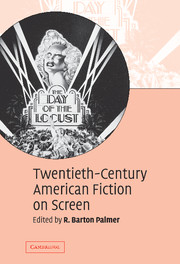Book contents
- Frontmatter
- Contents
- List of illustrations
- Notes on contributors
- Acknowledgments
- Introduction
- 1 Filming an unfinished novel: The Last Tycoon
- 2 The texts behind The Killers
- 3 The Day of the Locust: 1939 and 1975
- 4 Ship of Fools: from novel to film
- 5 Intruder in the Dust and the southern community
- 6 Dramatizing The Member of the Wedding
- 7 Film and narration: two versions of Lolita
- 8 World War II through the lens of Vietnam: adapting Slaughterhouse-Five to film
- 9 John Huston's Wise Blood
- 10 Genre and authorship in David Cronenberg's Naked Lunch
- 11 Screening Raymond Carver: Robert Altman's Short Cuts
- 12 The Color Purple: translating the African-American novel for Hollywood
- 13 The specter of history: filming memory in Beloved
- 14 Filming the spiritual landscape of James Jones's The Thin Red Line
- Filmography
- Index
- References
7 - Film and narration: two versions of Lolita
Published online by Cambridge University Press: 12 January 2010
- Frontmatter
- Contents
- List of illustrations
- Notes on contributors
- Acknowledgments
- Introduction
- 1 Filming an unfinished novel: The Last Tycoon
- 2 The texts behind The Killers
- 3 The Day of the Locust: 1939 and 1975
- 4 Ship of Fools: from novel to film
- 5 Intruder in the Dust and the southern community
- 6 Dramatizing The Member of the Wedding
- 7 Film and narration: two versions of Lolita
- 8 World War II through the lens of Vietnam: adapting Slaughterhouse-Five to film
- 9 John Huston's Wise Blood
- 10 Genre and authorship in David Cronenberg's Naked Lunch
- 11 Screening Raymond Carver: Robert Altman's Short Cuts
- 12 The Color Purple: translating the African-American novel for Hollywood
- 13 The specter of history: filming memory in Beloved
- 14 Filming the spiritual landscape of James Jones's The Thin Red Line
- Filmography
- Index
- References
Summary
As Wayne Booth points out in The Rhetoric of Fiction (1983), we react to narrators as we do to persons, finding them likeable or repulsive, wise or foolish, fair or unfair. Narrators vary widely on a broad spectrum, not only in terms of likeability but also in terms of reliability. Some are honest brokers, while others are pathological liars. On a scale of trustworthiness, narrators range from those who are almost completely suspect (such as Jason Compson in The Sound and the Fury [1929]) to those who are more or less reliable (Nick Carraway in The Great Gatsby [1925], Bras Cubas in Posthumous Memoirs of Bras Cubas [1880]) to those who serve as dramatized spokespersons for the implied author and whose values conform to the norms of the text (Joseph Conrad's Marlow in Heart of Darkness [1902]).
What interests me here is a particular kind of narration, to wit unreliable narration. The modern period has been especially fond of 1) changing narrators and 2) unreliable narrators. Changing narrators alter their discourse and ideas as they narrate; they mutate before our eyes. This trait is especially true of the Bildungsroman or novel of development (for example, Great Expectations [1851]); part of the plot, in such novels, is not just what happens but how the narrator changes as a result of what happens, for example when Pip learns about the true source of his fortune.
- Type
- Chapter
- Information
- Twentieth-Century American Fiction on Screen , pp. 111 - 131Publisher: Cambridge University PressPrint publication year: 2007
References
- 1
- Cited by



